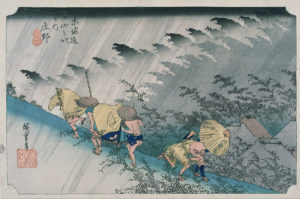Jessica, becoming ever a more beautiful teen, should be too old for these baskets, but I guess she likes getting one, too. They’re very, very elaborate. Adrienne shops for weeks or months ahead of time, packing away trinkets, tiny toys, spongy yellow duck confections. Then, confetti and ribbons and cellophane. Frankly, it’s fancier than the VIP Fruit Basket at the Hilton.
The Synthesizer

East L.A. 1969: I lived in a house with roommates, one of which was a jazz musician named LaMont Johnson.
One night I had a peculiar dream: I was a musician in a space-age society, and gave a concert for a small auditorium of people, playing music by moving my hands inside a square ‘grid’. The music must have been really good, because both myself and the audience just got caught up and we were all getting higher and higher and higher.
And somehow, we never came back. We just dropped those bodies. I woke up thinking I’d either been a stupendous musician or maybe an unusual mass murderer.
Over breakfast, I told my roommates about my peculiar dream. And LaMont said, “Such a thing exists. It’s called a syn-the-sizer, and I know a guy who has one.” We stared in amaze. He continued, “Would you like to go see it?”
Two nights later we drove to an industrial area. In East Los Angeles we found a warehouse filled with strange machines all covered over with cloth.
In a small side room I met Paul Beaver, who, along with a teen-age keyboardist, was making one of the earliest US electronic records, later to be called ‘The Nonesuch Guide to Electronic Music.’
Mr. Beaver and his keyboardist had Moog Synthesizer #2, looking for all the world like a row of suitcases filled with knobs and colored patch cords going from one to another. In the middle of the room, like a miniature refrigerator, was an Ampex tape deck. Beaver would write the arrangement and program the synth. The keyboardist would play the line, and they’d record the track. Line by line, instrument by instrument. It just knocked my socks off.
And that was that, until 1981.
Married and operating Network Answering Service in San Francisco, one day I went to the West Coast Computer Faire, and there I heard the strangest and most beautiful sound. It was faint through the hubbub, but I tracked it to a booth where a guy was demonstrating software which was played a Yamaha DX7 synthesizer. I decided to learn to make that beautiful sound.
I told my wife that I was going to get a DX7, and she said, “That’s odd.”
Because one of our answering service clients had a message up about a DX7 for sale. We had served this musician for years; he wrote commercials in an office at Ghirardelli Square. I called him. Although I’d taken his calls for years, we’d never met. He lived in a gorgeous house beside one of the parks.
As I was sitting at his dining room table, writing his name onto a check, I suddenly got the impression I’d heard his name once long ago. His name was Bernie Krause. Flash! I asked him, “Years ago, were you a teen-age keyboardist with Paul Beaver in a warehouse in Los Angeles?”
Yup.
Network Answering Service
San Francisco, 1976: But it actually started with Lamont Johnson, a jazz piano-player in Los Angeles, in 1969. At breakfast, he told us roommates his great new plan. We would start an answering service, for musicians!
“A what?” I asked. He explained it. Answering services used switchboards to answer the phone when the musician was out. I knew how to operate a switchboard, because of my hotel jobs. As soon as we had a switchboard and some clients, we could all take turns. He showed us listings in the Los Angeles yellow pages. Not one of these answering services specialized in serving musicians!
It sounded like a swell idea. Quickly we were recruited. Me and another guy were sent to obtain an endorsement from the head of the Los Angeles musician’s union. I made up some charts with pictures of statistics going up. We got an appointment.
The gentleman was very kind, and never once laughed at our clown act. He just explained gently that he was not able to endorse one company over another, though he very much appreciated us letting him know about our new company.
I tried to find a pleasant-sounding way to explain to Lamont that we were abject failures. Luckily, none of the others had one whit of success either, and to our great good fortune, we did not start up an answering service for musicians.
Thus it was that, years later in San Francisco, when I opened my phone bill and a little advert fluttered to the floor, I read about this new feature, Call Forwarding.
“Hmmm,” I said to myself, “You could use that to forward a whole bunch of phones. You could build an answering service without a switchboard.”
I did some research, meaning that I got my friend Dennis to ask questions of his answering service. This company had 2200 customers and 30 operators. After allowing for different shifts, this meant that each operator could handle 280 customers. (Later experience revealed no truth whatsoever in this formula.)
After my careful research, I got some phone lines and a bootleg pushbutton phone. I wrote “Bad Air Detector” on the switching box so the phone company guys wouldn’t know what it was. I placed an ad. I waited for the phone book to come out.
The phone rang. The guy asked about our service and I told him about call-forwarding. Our hours? Our prices? He signed up.
In my studio apartment, thus sprang Network Answering Service.
Six a.m. to Midnight. At first, I was the only operator. My favorite station went off the air at Midnight, same as me. Every night, when Midnight came, they played this lovely song called the Pachibel Canon.
And every night, it sounded so sweet.
Changing Your Name
I don’t know about that. But I do believe that each of us acts out our name. Or, rather, we act out the meaning of the name, as it appears to us.
It might not be as obvious as somebody naming himself “Ringo Starr” and then becoming a star. Or it might.
For myself, growing up in Texas as “Richard French” — no, as a child I was called “Dicky French” — this name was a mixed message. On the one hand, France was an exotic place, mysterious and unique, foreign. On the other hand, Dicky was a little name, and it grew suddenly worse when I became a teen.
I spent my teens coercing people to call me Richard, and acting like a foreigner in a strange land. I was a flop at sports. So I became a beatnik. Couldn’t do football, so I focussed on Band.
I was acting out my name, as it appeared to me. And I think this is common. And if so, then you could change your name to choose a new act. The life of my friend, Tom Pinch, improved in every way when he became Thomas Franklin.
OK. Maybe you agree. Maybe you have a different theory. But if you are thinking about changing your name, think on this:
First, in California you don’t have to do anything special to change your name. As long as you’re not committing fraud, if tomorrow you wish to be known as Bignose Butterfly, well, then that’s your new name. You can even go get a new social security card. Amazing.
If you’re in business, as I was, it seemed good to have a piece of paper, so I filed a paper with the San Francisco court. In due time, Judge Ollie-Victoire asked me, “You wish to change your name for business purposes?” I said yes. Bang went the hammer.
That was easy, wasn’t it? But next, there is danger. An early client at Network Answering Service was a black guy just starting an acting career. He’d chosen a name that would stand out: Buriel Clay. This name worried me, seeming a dangerous act to follow. My fears were founded. In less than a month, he became a statistic at the corner of Van Ness and Geary.
So did I learn carefully? I did not! For my new name, I chose “Arthur Cronos,” because it sounded good. Arthur, Lord of all Brittany, and Cronos, the father of Jupiter. Heads of our Anglo and Greek culture, no?
No. Think deeper. Remember the story of Arthur?
Guenevere ran off with Lancelot, right?
Well, now you know what happened to my marriage.
Bummer. So heed ye well. Ponder carefully. Don’t test the water with both feet.
Mick Jagger’s Secret
 San Francisco, 1977. Disco was in full sway, as the Men’s Club — myself, Richard W., Derek S., and Phil Groves — drove to dinner. Somebody was complaining about something.
San Francisco, 1977. Disco was in full sway, as the Men’s Club — myself, Richard W., Derek S., and Phil Groves — drove to dinner. Somebody was complaining about something.
“You don’t have to do it! Oh, noooo!” I sang, mimicking BeeGees. Ha, ha, ha, ha, ha. Derek had wrangled tickets to the upcoming Stones concert. We were jovial. We were on top of the world.
Earlier that day, I’d visited City Hall. A business license, as I recall. Oddly, there was a San Francisco streetcar sitting on the sidewalk in the square across from City Hall, one of those fake streetcars that run on tires. And a TV crew loitered about.
“What’s going on?” I asked the crowd of gawkers standing on the grand steps leading up to the doorway.
“Mick Jagger and the Mayor,” somebody said. The Mayor. That would be Diane Feinstein. But I didn’t see any Stones, and I didn’t see Ms. Feinstein. My business license beckoned.
When I came out, across the street, hanging from the streetcar while TV crews shot from below, Mick and Diane were chatting it up. Big smiles flashed. Wonderful, so happy, really looking forward. Publicity for the Mayor. Publicity for San Francisco. Publicity for the Stones. Everybody happy.
Huge bodyguards in black suits frowned the casual passersby away. I noticed the long, black limousine parked down below, and made a calculation in my head. Up the block, I crossed the street, and then walked slowly back, on a diagonal crossing the street.
Sure enough, the shoot was done and Jagger, trailed by black suits, was crossing the street. Our paths intersected so we were walking side by side, two feet apart. He looked over at me. I looked over at him. There was something important that I wanted to know.
“How do you stay so thin?” I asked. He nodded.
“Don’t eat much,” he said.
Annelie’s Haiku
Annelie. If I had been smarter- But let that pass. Any college girl who wears leopard-spot pants, and gets away with it … any college girl who, learning I’d never had a bagle and had never heard of lox, brought an entire picnic to my apartment … Well. So many missed opportunities in a life. A pity they are so clear, later.
This Haiku.
Now this was a revelation. A poem … that didn’t have to rhyme! A form far simpler than iambic pentameter. Shelly and Keats in my thick English books had nothing on these japanese guys. Both simple and elusive, all at once.
I thought I’d try it.
But what? I needed a subject! I saw nothing in the lobby. Aha! Nature! I decided to go outside.
It was cold. I looked around. Cars parked between white-painted lines, the double row of Holiday Inn rooms. Everything quiet. Then I looked up.
Now, as I gaze up,
the silver-tipped moon-crescent,
spikes the sky into place.
There. Who could forget such a moment?
The Abandoned Road
 Dallas, Texas, 1966: On this particular day, my girlfriend and I decided to take the psilocybin before heading out. Driving the Morgan from Dallas to Shady Shores was an odd adventure. It was about thirty miles, and seemingly many days driving.
Dallas, Texas, 1966: On this particular day, my girlfriend and I decided to take the psilocybin before heading out. Driving the Morgan from Dallas to Shady Shores was an odd adventure. It was about thirty miles, and seemingly many days driving.
I knew of this place from years earlier. College roommates and I had lived nearby, and some scouting trip discovered an abandoned roadway that had once run atop a dam built across Lake Dallas. In a concrete building halfway out, remnants of the dam’s machinery remained, huge wheels and vast pipes, going nowhere.
Whoever these mysterious builders were, they were fickle, for after building the dam across the lake, they’d cut a hole through it, so it was no dam any longer. Just a finger of elevated land reaching toward, but not touching, a finger of land from the other side. On the elevated crest, earth and stone and even trees, and the once roadway ran, and stopped at the cut.
Just the spot for our picnic.
I recalled a time from college when the gang of us, plus the girl gang too, hiked beyond the road’s blockade, and spent an afternoon with beer and burnt hotdogs and more beer, on the crescent moon beach that formed at the end, beside the cut.
Now, above the Morgan, the day was turning overcast, the air keen and wild. I parked beneath the trees, and we hiked. It was a strange journey. Past the old spillway’s jumbled boulders, and there among the mesquite trees, we stumbled across a horrible and alarming black and orange snake, which proved to be a fragment of nylon rope.
The ground was heaving, and the trees whispered. The sky darkened, and a breeze began to blow. As we sat beside the abandoned roadway, to the west the sun peeked out, low across the lake.
The water between sparkled with flashes of God and the unseen heavens beyond this Earth. Bright flashes, as bright as the sun, and the water’s chop swirled them round and round in a pattern we could sense, and could almost see clearly.
And then clouds came in from the northwest, and the sun was covered, and the clouds drifted, a million miles above the earth, and slowly across the lake. The breeze returned, lifting the grasses around us, whispering. Then, from the clouds, rain.
Falling in parallel streaks like a Hiroshige print, going on eternally, and the lake turned its face up to receive the gentle rain.
I’m sure we returned to our homes later; unless, of course, we are still there.
Law 23 of Marketing Differentiation
You don’t have to be better, but you must be observably different.
That’s it.
If you’re not somehow different, then you’re just another one. No winner is ever just another one. It’s best to be the first one. But if not, then find a way to narrow the field so that you’re the first one in the subdivision.
For example, be the first vacuum-cleaner manufacturer. If you can’t be the first vacuum-cleaner manufacturer, then be the first vacuum-cleaner manufacturer with modern designer colors.
Knowing this important secret of the universe, go forth and prosper.
- « Previous Page
- 1
- …
- 61
- 62
- 63
- 64
- 65
- …
- 75
- Next Page »

